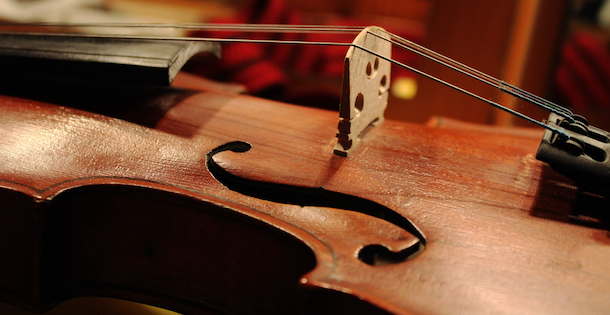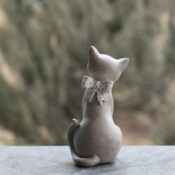Something about the car parked beside the house — a red Chevy Aveo — Alex did not like. It aroused vague disquiet, like the scent of a predator. The license plate jumped at him: the ghostly visage of Abraham Lincoln and “Illinois” in rolling blue script. His jaw tightened. What was she doing here today? He considered driving off before someone inside saw him. But suppose someone already had?
It didn’t matter. The battle lines had moved. The front had advanced. Retreat was not an option.
Creaking steps announced him at the back porch. Through the screen door, he saw Sean spring up from the kitchen table. Sean’s voice cracked with surprise as he unlatched the door. “Uncle Alex?”
Alex shuffled inside. “Hey, Slim.”
Across the table, eyes bright and flashing behind Oleg Cassini frames fixed him in the doorway. She greeted him: “Speak of the devil.”
“Hi, Claire. I thought y’all did this on Tuesdays.” Today was Thursday.
“We changed it this week,” Sean said. “Miss Claire had detention hall Tuesday.”
Claire hoisted the Bible-sized Norton Anthology of American Fiction on her lap. “I thought of you when I read this story again. The main character is a musician. And the bandleader is named Creole. Your timing just now was perfect. You came in right on cue.”
No. His timing could not have been worse.
He gestured with the fiddle case in his hand. “I was out this way, so I figured me and Sean’d run through a few songs for Sunday. Sorry to interrupt.”
“We can wrap this up if you want,” Claire said. “Sean told me he’s sitting in with you for a few numbers at Festival Acadiens. I think that’s terrific.”
She sounded so generous, even flattering. But Alex always heard more than her words.
They’d met last July at the Creole Folklife Festival at LSU-Alexandria, where he was giving a fiddle workshop. He’d stopped in to hear his old friend Lorene Broussard spin tales in the Black Storytellers Alliance tent. As they talked afterward, a woman approached, dressed in crisp khaki shorts and yellow polo shirt, with bobbing copper ponytail and freckled cheeks, peering into the grease-stained lunch sack in her hands.
Lorene seemed to know her. “You get you some cracklins, boo?”
The reply came in a flattened Midwestern twang: “Yeah, I thought I’d see what I been missing all these years. Anyone?” She offered the bag to them, then picked out a chunk of pork skin. She studied, crunched, and critiqued. “Hmm. I think there was a piece of fat on this one. Deep-fried pork fat. I knew there was something I loved about this place. Seriously, Miss Lorene, it’s a wonder you people have survived this long.”
Lorene laughed, but the remark bothered Alex. Something in her tone sounded so … Yankee. So … white.
Lorene introduced them. This was Miss Claire, Claire Hopkins, come down from Rockford to teach a few years at the high school. “That far?” he asked. “What’s down here to bring you all that way?”
“Teach for America. I teach for a couple of years at a small-town school and get brownie points on my résumé. I also get to immerse myself in Louisiana culture. Pretty sweet deal, if you ask me.”
“And what do you think of Louisiana culture?”
She rattled the bag of cracklins. “The more I get into it, the more I like. Except the cockroaches. One skittered across the kitchen floor last night the size of a medjool date. Indestructible, too. I gave him my best Wayne Gretzky slap shot. Barely fazed him.”
“And the names? At first I thought half the parish was Italian. I met more Comos and Dimaggios than there are in the Rockford phone book. Then I saw it written. C-o-m-e-a-u-x. D-o-m-i-n-g-e-a-u-x. And me, an English teacher. I’m learning to spell all over again.”
Alex smiled. But something in her humor set him on edge. Exactly what, or who, was she laughing at?
Seeing her at Eva Crochet’s gallery a week later salted the sore. Eva was helping her pick out a present to send to the school where she taught back home. They went through the alligator skull paperweight, the corn husk dolls, and every Floyd Sonnier sketch in the shop before Claire decided on the hand-carved miniature pirogue. All the while, she marveled at the craftsmanship, the ingenuity of the local artists. She told Eva her place was a treasure, passing on traditions to a younger generation almost a sacred trust — as if Eva didn’t know that.
The same with her lecture on the virtues of buying local, delivered at Lejeune’s Automotive. Pete Lejeune’s son Gerald had planned to take over the business, until the Walmart Tire & Lube opened on the highway west of town. Now Gerald was night manager at the Best Western in Kinder, while his wife, Eloise, bused tables and refilled steam pans at the Coushatta Casino buffet.
And that was before Teresa heard from another parent what Teach for America was: bright young teachers coming to poor, failing schools. It all added up. And it made this habit of hers, which was only a nuisance on neutral ground, almost an insult here. Here in his sister’s home, a converted shotgun house on Bayou des Cannes, where added rooms with sheet vinyl floors settled unevenly with the prairie soil, and wooden doors and window panes swelled and stuck, open or shut, with the humidity. Where his father’s family had sharecropped into the ’50s. And now where she came every week to tutor Sean, his nephew, his student in the Creole fiddle tradition.
He should be grateful; his sister was. Sean was struggling as he started high school. Teresa had threatened to banish the fiddle to the closet as a distraction, like TV, where it might go untouched for weeks at a time, as wrist and shoulder muscles shrunk and interest waned. Then Claire came to the rescue, refusing pay, wanting only to help. Apparently, she was: Sean was still playing.
Her offer now raised the ante, and she held the stronger hand. If he left and let them finish the lesson, she won. If he let her cut it short, she still won.
He set down his fiddle and pulled out a stool at the counter behind her. “Y’all take your time. You don’t mind if I listen in?”
Claire flexed the book at its binding, a warm-up exercise. “Take notes. There will be a test.”
With that she plunged back into the discussion, leaving Alex to piece together fragments of the story: the younger brother, Sonny, had a drug problem and wanted to be jazz pianist, the older brother was set against it. Mostly, though, it was Claire who commanded his attention. Quick, witty, intense — did she ever let up? — she led Sean through scenes and lines of dialog, laying clues to help him discover how everything fit together, how this action revealed that character and that image carried the theme. With pride — selfish pride — he thought that Sean was more adept at learning double stops from him than making literary connections with Claire.
“What’s the big deal about music?” Claire was asking. “Why doesn’t Sonny just grow up and get a real job?”
“It’s too important. His music is like, a part of him. It’s real to him.”
“It’s real? You mean it’s not real to the rest of us?”
Sean tried again. “I mean, he’s lived it.”
“What does that mean — he’s lived his music? How can you live music?”
Sean was getting frustrated. Alex too. “He knows what it means,” Sean said. “It’s like, he knows what it’s talking about.”
“Talking?” Claire riffled the pages. “I didn’t see any lyrics here.”
Sean sighed. Alex too.
Claire cocked her head, glancing from the corner of her eye. A smile trickled across her face. She straightened her satiny violet bookmark on the page, nestling the cord in the binding, letting the gold star hang over the top. Squeezing the book shut, she pronounced: “To be continued. You’re getting it, Sean. You’re very close to the heart of this story. You just have to be precise. Then we’ll both know you’ve nailed it.”
Sean nodded, slumping as though winded. Alex felt his own spine loosen, his mood lighten. He reached for his fiddle case. “See you ‘round, Claire.”
“You’ll see me Sunday for sure. Slim, you better be good. And don’t let your uncle steal your licks.” Her hand was on the screen door, her foot on the threshold, when she paused and turned back, her eyes hopeful.
“Can I ask a favor? Is there some musicians’ code against having an audience when you rehearse? Is that like watching a magician practice his tricks?”
The tension returned. Why didn’t she just say it? “You wanna listen to us rehearse?”
“If you don’t mind. I’ve been to festivals and clubs and all, but there’s something about being one-on-one. It’s like reading a writer’s first drafts of a novel. You learn more about it that way. About what makes it good.”
Alex looked at Sean. Sean shrugged. “Okay by me.”
With anyone else, it would have been okay by him too. But the urge to make a new convert soured with the suspicion that the faith wouldn’t grow here. She said so herself: She wanted to learn about it. For all he knew, it was something she could use on her résumé.
It wouldn’t be the first time. Obscurity had one consolation: People weren’t fans of this music because it was trendy. They might come from curiosity, but it was love that brought them back. Yet for every one who stayed, who-knows-how-many shook their heads and walked away and maybe told their friends back home, with amused smiles, about that scratchy folk music those people liked.
Claire to her credit had signed on for two years. That entitled her to something.
He picked up the stool. “We use the back porch. The floorboards sound better.”
He and Claire went out front while Sean went for his fiddle. Alex scanned the shorn, burnt-umber rice fields of the neighbor’s farm. White egrets speckled the marshy tractor treads, stalking frogs. Farther beyond, a few Angus cattle grazed against the backdrop of a clear October sky. Perfect for making music. He settled on the stool and bowed the strings lightly, like a vodou conjurer in the presence of spirits, the fiddle giving them voice.
Claire perched on the railing. “That’s beautiful. The fiddle, I mean. Even I’m not impressed by a few notes.”
It was beautiful: the patina on the neck worn and polished with sweat and oil from his hand; the nicks in the scroll from a car crash, re-stained by rubbing with pecans; the pegs scorched from a small kitchen fire one Mardi Gras. “It’s seen some years.”
“Is it true that older fiddles sound better?”
“If they’re made right. The wood relaxes. The sound … mellows. And the longer you play it, the better you play it.”
She nodded. “Have you played that one since it was a baby?”
“No. I bought it from my teacher.”
“Is that how most people learn, by taking lessons?”
Was she thinking of taking it up? “And sitting in with older guys at jams and parties.”
“Do you do that a lot down here? Do people bring their fiddles to a party instead of CDs?”
Alex slashed his bow across the strings. The fiddle shrieked, silencing her. He smiled. Friendly spirits. “So how’s Sean doing? His grades are better?”
“Oh, yeah. He’s a sharp kid. He could do even better if he put more effort into it, but that’s true of 90 percent of the students. A lot of kids have trouble jumping from grade to high school. But he has his music, that grounds him. It’s what sports or science club does for the others.”
“Did you tell his mom that?”
A quick, fleeting lift of her brow made him sorry he’d said that. He felt exposed.
“I tell him he should use it as a subject for an essay or a history project,” Claire went on, “but he seems kind of shy about it. Maybe you would have some pull with that.”
Alex shrugged. He didn’t involve himself with Sean’s school life. Theresa kept after him enough. But he liked that idea. Her idea. Claire’s idea.
A sudden boom shook the air. The house trembled. Claire startled. “Is someone hunting?”
Other than her? “Wild hogs,” he said, calmly inspecting the fiddle pegs. “Big ugly things with tusks? They run around all over out here.”
“They do not. Uncle Alex.” Sean’s voice cracked with accusation as his fiddle case shoved open the screen door. “It’s farmers, scaring off cowbirds.”
“Yeah, they’re worse than hogs,” Alex said. “They eat the rice and lay their eggs in other birds’ nests. They came with the buffalo a hundred years ago and never left. What do they call that? Invasive species? Sean, you remember to roll your wrists?”
They warmed up playing scales, Claire looking from one to the other in fascination. Alex trusted she at least knew not to ask questions while they played. “All set, Slim? All right. Let’s try ‘Allons Danser.’ You lead, I’ll second.”
Sean swung into the song. Alex, backing him, listened for technical mastery: “You’re starting to saw. Keep a loose wrist. You got it.” But more for the style marks of Creole fiddle, the bowing patterns, the shuffling and slurs. Occasional glances at Claire found her swaying lightly, toes tapping the air, pantomiming their own feet slapping the boards.
They moved on to “Lake Arthur Stomp.” Sean seconded Alex with understated rhythm. Together they attacked the rapid-fire trills of “Bernadette,” as much percussion as strings, friendly rivals daring each other. In Sean’s swaggering strokes on “Shoo Black,” Alex heard hints of a personal style emerging. Without realizing it, Sean was making the song his own. It reminded Alex, with fresh amazement, how the music renewed itself, like yeast: A little added to the dough, and the bread would nourish another generation. All it wanted was someone to knead it in.
“Sounding good, Slim.” Alex would have ended the session there and left victorious, but Claire jumped in.
“Sean, do you ever sing?” she asked.
“Nah, I can’t sing.” Sean’s nose wrinkled. “And they’re mostly love songs anyway.”
“Oh.” Claire nodded sagely and stage whispered at Alex. “Love songs.”
“The lyrics were mostly place holders,” Alex explained. “The music is the important thing.”
“Hmm. Lorene’s trying to teach me a song. You probably know it. So far I’ve got this.” Claire sang, in a painful attempt at the characteristic, across-the-prairie cry:
“Soleil après coucher, et la lune après briller
Coosh-coosh après brûler, et caillet n’est pas tire.
Faut voir qu’elle heure est-il.”
Alex winced. She had moxie, he had to admit.
She looked at Sean. “Slim. You know what that song is saying?”
Sean looked bewildered. “Something about the coosh-coosh burning.”
“Yes. And why should anyone sing about burning corn mush?”
Sean looked at Alex. Alex looked at Claire. The teacher had returned in her voice, she had retaken center stage. Where was she going?
“Uncle Alex, help me out here. I’m out on a limb,” Claire said. “Soleil après coucher. ‘The sun is setting,’ right?”
Alex nodded. “Et la lune après briller.”
“And the moon is shining.”
From the end of the first verse on to the second, Alex recited in Creole French, Claire echoed in English:
The coosh-coosh is burning
Look what time it is
The cow hasn’t been milked
Me, I’m crying
My man isn’t come back
Look what time it is
Sean still looked lost, waiting for the point. “So. The coosh-coosh is burning and the cow didn’t get milked.”
“And my man isn’t home and it’s after dark,” Claire said.
Alex saw where she was going. “When the song was written, that was bad news, Sean. For a black man to be out after sunset.”
“And not because his wife would lock him out of the house,” Claire said. “Think of her there. Fussing that the cow needs milking. Lifting the lid on that skillet of burnt mush, maybe burning her fingers, scraping it out. Complaining that her man is out late. Saying ‘Doesn’t that fool know what time it is?’ She’s scared to death.”
“Oh — yeah.” Sean fingered his bow, his gaze dropping to the floorboards.
Alex felt his nephew’s unease. Any particular reason Claire was dredging up this humiliating piece of the past?
“Why would anyone write a song about that?” she said. “I thought this music was supposed to make you forget hard times.”
Alex answered for them both. “Because some things you can’t keep inside. You gotta let people know what’s going on.”
“But it isn’t going on. Things may not be perfect today, but from what I’ve seen, nobody here worries about being out after sundown. Not the crowd at El Sido’s or Blue Moon Saloon. Why do you keep singing it?”
“It’s a part of who we are. You can’t understand us today if you don’t know where we come from.”
“So … it’s important for me to know how your great-granddaddy felt about something I will probably never experience myself. Is that it? Even something as painful and frightening as being lynched?”
“Especially something —” Alex stopped. She was acting too dense, too naïve.
“And the best way for me to do that is through his music? Sean. Any of this sound familiar? Pain? Fear? Music? Sonny?”
Alex corrected himself. Claire wasn’t bold. She was reckless. She had entered the lion’s den, waving red meat, daring him to react, provoking him to think. She could be cut to pieces, shredded like ribbon by his anger, his confusion, his rejection. Or he might open his eyes, the lion might. Her lion.
“You were right, Sean. Music does talk. And sometimes — at its best — this is what it says. It tells a story. Sometimes an ugly story. But one that people won’t listen to any other way.”
Suddenly the lion awakened, with the excitement of discovery. “That’s why Sonny wanted his brother to go hear him play. His brother didn’t want to hear about the drugs and prison and all. But Sonny had to tell him.”
“Yes. And you were right when you said Sonny had lived his music.” Claire’s face was vivid, her eyes glistened. “His music was his life story. It was his autobiography.”
“And why Sonny’s brother has a problem with that, we’ll get into next time. Alex, you’re welcome to join us.”
The offer caught him off guard, but Claire didn’t wait for a reply. She dropped from the railing and assumed a Midwestern drawl. “Because now, the soleil après coucher. Time for me to partîr. I’ll see you tomorrow, Sean. Alex, I’ll see you Sunday.”
She’d reached the bottom step when Alex spoke. “Sounds like Miss Lorene taught you that song pretty good.”
She shrugged. “I’m just a sucker for a good story. Lucky for me I’m an English teacher.”
Alex spoke loudly as Claire headed for her car. “Someday, Slim, Miss Claire is going to have to tell us her story.”
She answered without turning. “My story? Oh, it’s not very interesting. Not at all worth putting to music. Put y’all to sleep, more like.”
“Yeah, I bet.” The Aveo’s door slammed, gravel crunched. The engine rumbled, then faded into the prairie.
“Uncle Alex.” Sean called him back. “Should we go through a few more?”
Alex considered, then shook his head. “Nah, here’s good. You get to a point where more practice doesn’t help.”
“Are you sure?” For the first time, Sean sounded anxious. “’Cause … I’m still kinda … scared.”
Scared. Alex’s chest swelled, as if Sean had played one perfect, sweet, mournful, soulful note. He almost wished Claire were there to hear that. Almost.
“Good.”
Become a Saturday Evening Post member and enjoy unlimited access. Subscribe now



